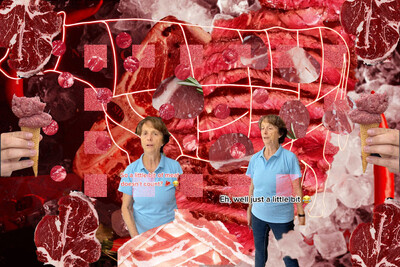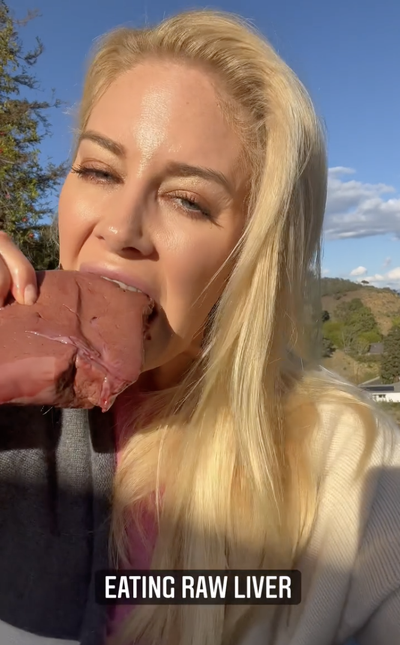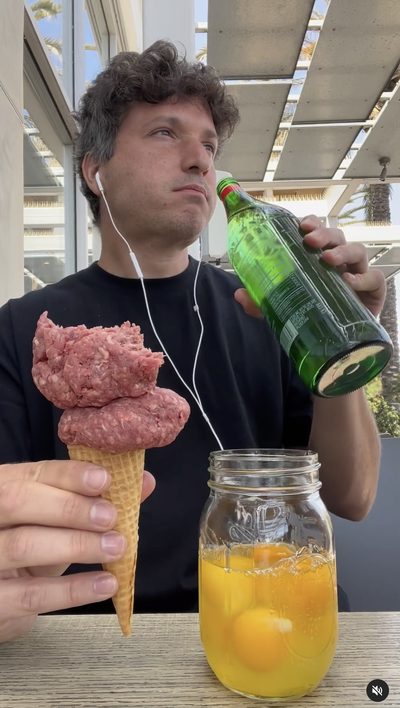The other day, a friend texted me a link to an article from Page Six: Heidi Montag snacks on bison heart as part of her raw meat diet
Photo credit: @heidimontag
No, I’m not a Heidi Montag superfan, nor am I trying to boost my fertility (the supposed benefit behind Montag’s diet). This article was just one of many meat-related items my friends felt compelled to share when they heard I was editing meat-themed personal essays for Prism. I’d also been on the receiving end of this fascinating article about meat in art, this TikTok in which someone’s Italian grandmother claims that a dish is vegetarian despite just a liiiiittle bit of prosciutto, and a lot of reminiscing about Lady Gaga’s meat dress. One friend recommended the titillating-but-stomach-turning French film Raw, which another friend misheard as the titillating-but-stomach-turning documentary Roar. (Both turned out to be relevant: the former is about a veterinary student who “develops a taste for human flesh”; the latter about African lions who inflict their existing taste for human flesh upon some very misguided filmmakers.) A third friend chimed in with a plug for Raw Meat Experiment, an Instagrammer with 150,000 followers whose succinct bio summed up the bit to which he had very thoroughly committed: “Eating raw meat at Whole Foods every day until I die from bacteria.”
Here, I should pause to confess that I’m mostly vegetarian, and have been for pretty much my whole life, ever since a beloved aunt got me a subscription to PETA magazine as a kid. But if I’m honest, I should further confess that my eating habits are a politics of convenience: I’ve never really liked meat, so it’s not like I’ve made a huge sacrifice.
In any case, I was surprised to find myself enjoying the meaty miscellany my friends sent. The Montag image, for example, had a mischievous, campy quality: she was practically winking at the camera, all perky blond ponytail and glinting gold aviators as she chowed down on a bloody, sinewy hunk of flesh the size of her own head. There was something honest about the image, I thought, despite the fact that it was obviously posed. It was a refreshing variation on the latte-spilling and sweatpants-wearing that populate the typical Stars: They’re Just Like Us! photo shoots. Stars: They’re Ruthless Bloodthirsty Carnivores. Just like us!
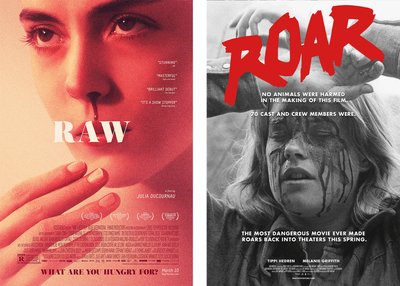
Photo credit: Focus Features / Photo credit: Olive Films
Raw Meat Experiment guy, on the other hand, was harder to read. It seemed impossible that he was 100% serious, but what exactly was the joke? As I watched him chase down a raw lamb chop with a mason jar full of raw eggs, I found myself almost admiring him, even as I was also totally repulsed. If my own mostly vegetarianism was an ambivalent default position, maybe I felt drawn to these meat maniacs for the sheer extremity of their choice.
Or maybe I was just falling for the ol’ carnivore cliches: no matter how evolved I thought I was, I still associated meat-eating with Real Hunger, a kind of masculinized intensity of appetite that slid very quickly down the slippery slope into sexiness, inasmuch as appetites are often sexy, and often edged with danger. On some level, maybe I looked at Heidi Montag and RME guy and envied their embrace of something insatiable, something animal. Their raw carnality. They let loose, while the rest of us held back.
Of course, there are downsides to being an “insatiable animal.” Holding back is a necessary part of being a social animal, or at least a human being in polite society. So where do we draw the line? When should we celebrate our “animal instincts,” and when should we rein them in? Maybe the reason meat is such a popular meme-medium is because many people are really, really conflicted about these questions. What looks on the surface like carnivore confidence—RME guy’s slonker swagger; Heidi Montag’s cheeky grin—might actually reveal a deep discomfort with the ways in which we are, and aren’t, “just animals.” And hey, I guess we all, uh, process the human condition in different ways.
"As I watched him chase down a raw lamb chop with a mason jar full of raw eggs, I found myself almost admiring him, even as I was also totally repulsed."
So maybe the absurdities of the meat-o-sphere can help us to see our conflictedness more clearly, and maybe even from some new angles. On the one hand, yes, it’s crazy to pretend we’re “just animals”; on the other, it’s crazy to pretend that we’re not. Maybe there’s value in considering which aspects of our animal selves we would like to protect and preserve, and which we might be ready to evolve beyond. Maybe we keep poking the taboos around meat because, like a kid who teases a secret crush, we kinda secretly love them—or at least, love something essentially earthbound and visceral and mortal about having a body at all. Maybe acknowledging this love can help move us toward a more nuanced understanding of our place in the world: less “top of the food chain” and more as just one piece of an interconnected ecology.
In the meantime, I’ve enjoyed my role as Official Meat Editor (it’s a niche field, but it can really beef up your resume). It’s definitely helped me begin to flesh out (see what I did there) some of these complex ideas for myself, and to recognize all that’s at steak (okay, okay, I’ll stop) when we decide who we are and who we eat.
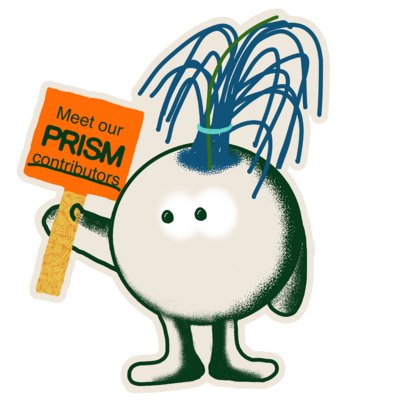
Ali Shapiro
Ali teaches writing at the University of Michigan’s Stamps School of Art & Design. Her comics, poems, essays, and reviews have appeared in various journals, including Gertrude, Prairie Schooner, The Rumpus, and Electric Literature.
Prism asks: If you had to wear a dress made out of any foodstuff, what would it be?
“I don’t really wear dresses, but I think watermelon radish pants would pair quite nicely with a rainbow chard top”
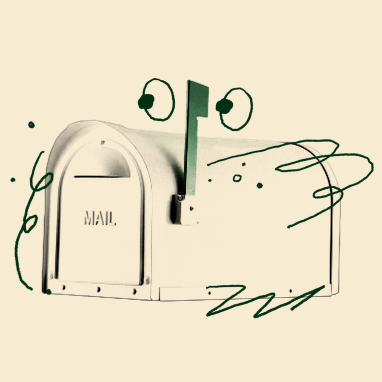
Wellness stories you won’t find anywhere else.
